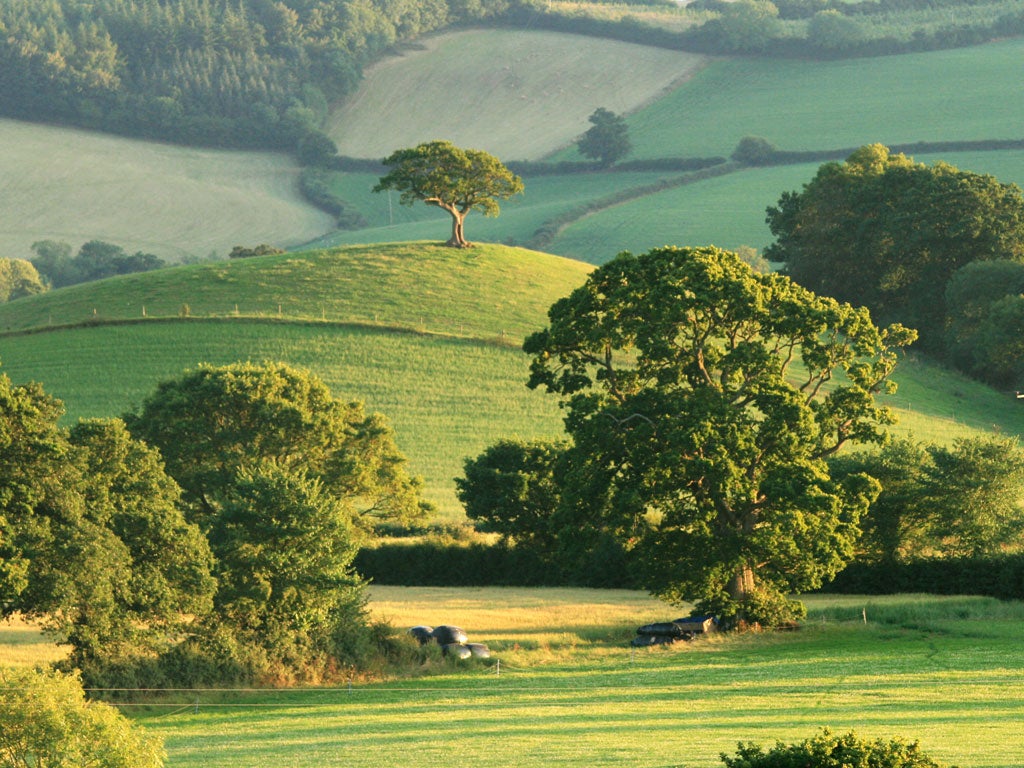The developers’ charter spells doom for our green spaces
This plan shows the government’s view of landscape as a commodity

The government is probably not quaking in its collective boots at the news that several leading authors, including Julian Barnes, Jeanette Winterson and Benjamin Zephaniah, are supporting a campaign to save Britain’s countryside from ill-directed development. The briskly urban view of these matters in Whitehall remains the same under the Coalition as it was under Labour, the only difference being that the current administration likes to utter warm words before sending in the bulldozers.
There is now one inescapable rule of development. Money talks. Whether planning to build a new supermarket or executive houses on a greenfield site, businesses are happy to deploy their financial muscle to batter local councils and residents into submission, while exploiting the planning system in precisely the way they accuse their opponents of doing. Localism, heralded as the chance for communities to control their own development plans, has delivered the opposite. Last year David Cameron promised that villages would not have “a great big housing estate plonked down from above”; since then, across the land, that is, almost to the letter, what has happened.
In that sense at least, the government’s new idea of biodiversity offsetting is consistent. The plans, currently at consultation stage (make your views known on the Defra website), would create new habitats, enhance existing ones and improve the environment – or so the government claims. In reality, they will do the opposite, putting the financial interests of developers and landowners before the landscape and those who use it.
The temptation is to worry most about what the authors, supporting the Campaign to Protect Rural England’s charter, call “the matchless beauty of England”: the plan, if adopted, would open national parks to development. The real threat, though, will be to the ordinary but much-loved green spaces within and surrounding cities, towns and villages, which until now have been protected by planning law which recognises their benefit to humans and the environment.
Biodiversity offsetting provides developers with the perfect business solution. To build over these areas, they would have to buy a lease on another piece of land designated as being suitable for environmental enhancement, and then pay the landowner a regular sum for its upkeep. It is a bonanza, in other words for developers and landowners. Builders will cash in. The value of land will soar in areas where offsetting is encouraged. On the other hand, people will have lost their parks or their favourite walks. Any area of “enhanced biodiversity” will be miles away – indeed it may not even be open to the public.
As for the environment, few initiatives illustrate more clearly the government’s view of landscape as commodity. Defra have blithely concluded that there will be no net loss to biodiversity and a net gain to nature. The peculiar assumption behind this claim is that landscape and habitat which has taken centuries to evolve can be created in an entirely new setting – that plants, insects and birds can be imported as if they were being introduced into a suburban garden for a TV makeover programme.
There is nothing wrong with companies being forced to invest in biodiversity to make up for the environmental cost of their activities but, if the pay-off is that they are then allowed to develop previously protected areas, it will be another government betrayal. The environment, and the human need for beauty and contact with nature will once again have been sacrificed to the greed of big business.
What odds on a first-class degree for your daughter?
No one could accuse that great boom sector of the British economy, the gambling industry, of lacking ambition. Since deregulation under Labour, a vast army of bookmakers has invaded High Streets across the land. The National Lottery has established itself as a greater cause for good than the Church of England. On sports channels, billions are being spent on cheery advertising campaigns designed to convince young viewers that the only way to enjoy sport is to have a bet.
No area of life is now complete without a bookmaker offering us a price on its outcome. Ladbrokes, for example, now encourages parents to take a punt on their children’s university results. Asked about the trend, education expert Sir Chris Woodhead described it as “a jolly piece of fun”.
Just now and then, we are reminded of how an addiction to gambling can ruin lives, particularly of the desperate and vulnerable, and yet we are cheerfully raising a generation which sees it as a harmless part of family life. If I were gambling man, I would bet that this jolly piece of fun will cause trouble and unhappiness in the future.
Join our commenting forum
Join thought-provoking conversations, follow other Independent readers and see their replies
Comments
Bookmark popover
Removed from bookmarks